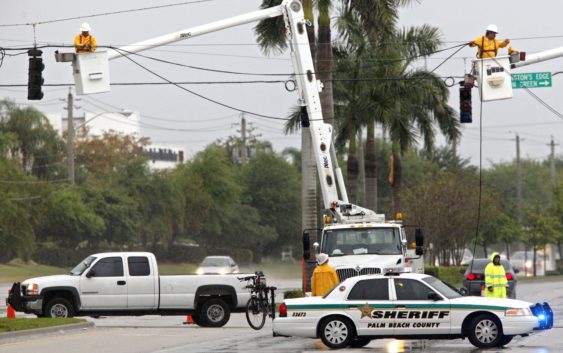- Seven months after Hurricane Helene, Chimney Rock rebuilds with resilience
- Wildfire in New Jersey Pine Barrens expected to grow before it’s contained, officials say
- Storm damage forces recovery efforts in Lancaster, Chester counties
- Evacuation orders lifted as fast-moving New Jersey wildfire burns
- Heartbreak for NC resident as wildfire reduces lifetime home to ashes
Hurricane Dorian: What to do at an intersection when the power is out

It’s a potentially dangerous situation in the wake of a storm like Hurricane Dorian: The power goes out, traffic signals go dark and drivers are left bewildered at intersections.
It’s a potentially dangerous situation in the wake of a storm like Hurricane Dorian: The power goes out, traffic signals go dark and drivers are left bewildered at intersections.
This scenario confuses even experienced people who have been driving for decades. Even lifelong Floridians, who should be familiar with power outage scenarios, can be flustered.
Do you stop? Keep driving? What if the signals are off completely — or what if they’re flashing?
Here are a few things to remember — thanks to the Florida Department of Highway Safety and Motor Vehicles driver license handbook and the National Highway Traffic Safety Administration — if you find yourself in this position.
What to do if the traffic signal is off
Treat the intersection as a four-way stop. If you arrive at the same time as another car — or even two other cars — the car farthest to the right goes first.
If four cars approach at the same time, the car that comes to a complete stop first is the first to go, then the car to the right, and so on in a counterclockwise rotation.
This may not always work. In that case, right-of-way goes first to a car traveling straight, then a car turning right, then a car turning left.
What to do if the traffic signal is flashing
If your signal is flashing yellow, you may proceed through the intersection without stopping. But do so carefully. Keep in mind that other motorists may be confused. Be prepared to stop if necessary.
If your signal is flashing red, you must bring your car to a complete stop before traveling through the intersection.
Key tips to keep in mind
NHTSA offers these tips to help you remember who has the right of way:
‒ First to stop = first to go: The first car to the intersection is the first to travel through.
‒ Farthest right goes first.
‒ Traffic going straight goes first.
‒ When in doubt, bail out: If you are unsure of who should go first, let other traffic move through first until you feel it’s safe to travel through.
Note: This article originally published online in 2017 before Hurricane Irma.
Sources: National Highway Transportation Safety Administration; Florida Department of Highway Safety and Motor Vehicles driver license handbook
kwebb@pbpost.com
@kristinawebb